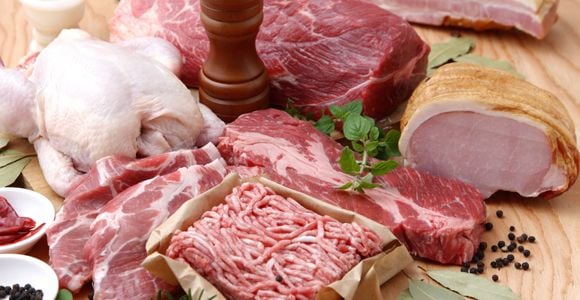Protein-based diets like Paleo and Atkins may be the darlings of today's nutrition gurus, but mounting research shows that these eating strategies may not be quite as healthy as they appear. High-protein plans, which usually feature meat, dairy and other animal products as the star foods, may be tied to some serious health consequences. If you're on such a diet right now, you may want to rethink your menu after you hear what the medical community has to say.
The Latest Research
Among the latest research is a study from the journal Cell Metabolism, which followed 6,381 adults ages 50 and older, and found that high-protein intake--particularly animal-protein intake--may be nearly as unhealthy as smoking cigarettes. In fact, participants between 50 and 65 who ate large quantities of animal proteins in middle age were four times more likely to die of cancer during the study period.
Even more disturbing, the study's definition of "high protein" was far less than that of some popular diet trends. Participants who got just 20 percent of their calories from protein fell in this category; on the Paleo diet, you get about 38 percent of calories from protein. That's nearly double!
Why Might Protein Raise Cancer Risk?
Studying mice, researchers found that high-protein diets increased levels of the growth hormone IGF-1. In the human study, they found that the more IGF-1 someone in the high-protein group had, the more likely they were to die from cancer.
"When you have a lot of protein, these growth factors go up, and we've shown that they help normal cells become cancer-like cells, and then they help the cells grow," explained researcher Valter Longo, biology professor at the University of Southern California.
The study may be disturbing, but it's not the first of its kind. In one clinical trial, researchers followed Seventh Day Adventists; none of them smoked or drank, and about half of them were vegetarians. They found that, despite the otherwise similar lifestyle, the vegetarians were significantly less likely to get cancer. Large-scale studies performed in Germany and England have yielded similar results, with vegetarians enjoying a 40 percent reduction in cancer risk.
In 2007, the American Institute for Cancer Research acknowledged the potential risk of an animal-based diet, noting that beef, pork, lamb and processed meats possibly increase the risk of multiple types of cancer.
And as the Physicians Committee for Responsible Medicine reports, countries that consume more animal fats, like those from red meat, butter and cheese, tend to have higher incidences of breast cancer.
Non-Meat Protein Sources
Plant proteins have not been shown to increase cancer risk, so choose beans, tofu, nuts and seeds to get your fill of this nutrient. Base the rest of your diet around whole, natural plant foods, such as fruits, vegetables and whole-grain breads and pastas, and get your fat from olive oil, avocados and other healthy sources. It may be a challenge at first, but you'll learn to love these foods as you grow accustomed--and you just may enjoy a longer life.
Nina Kate is a certified fitness nutrition specialist through the National Academy of Sports Medicine (NASM). She also studied journalism at the University of California, Los Angeles (UCLA), and has contributed to numerous major publications as a freelance writer. Nina thrives on sharing nutrition and fitness knowledge to help readers lead healthy, active lives. Visit her wellness blog at BodyFlourish.com.



